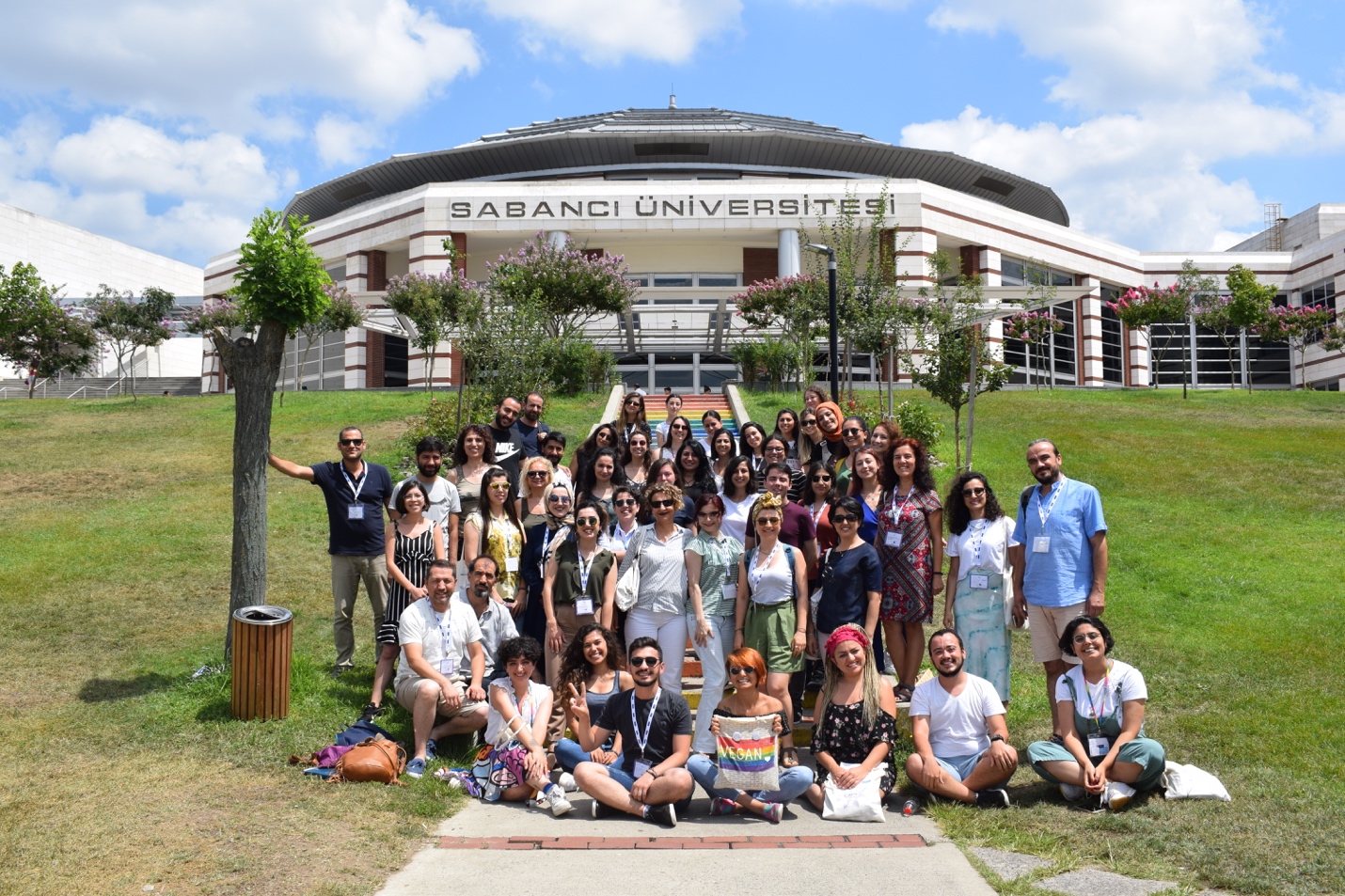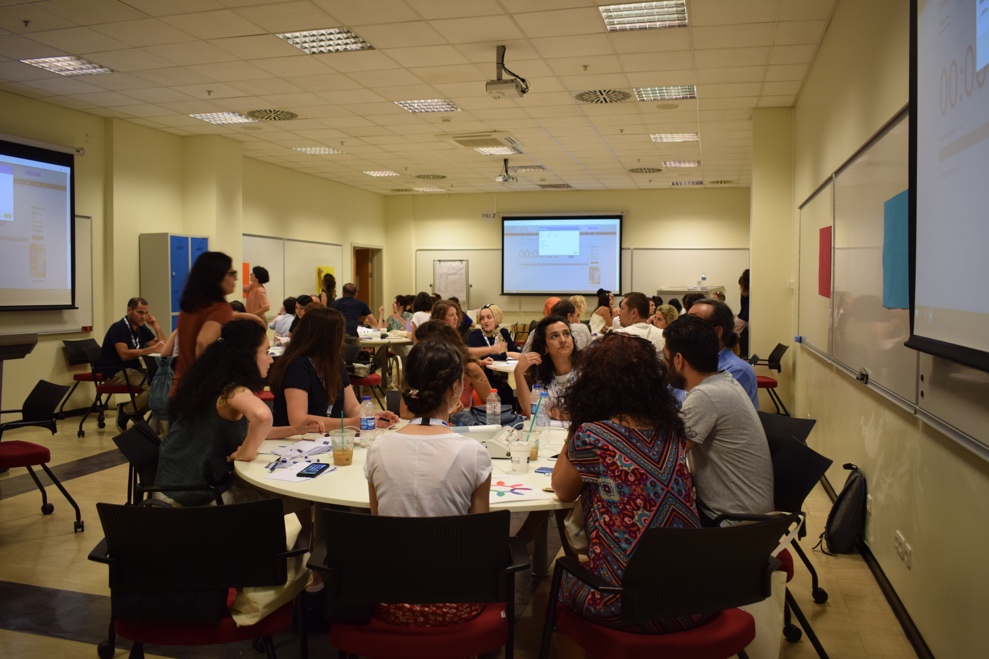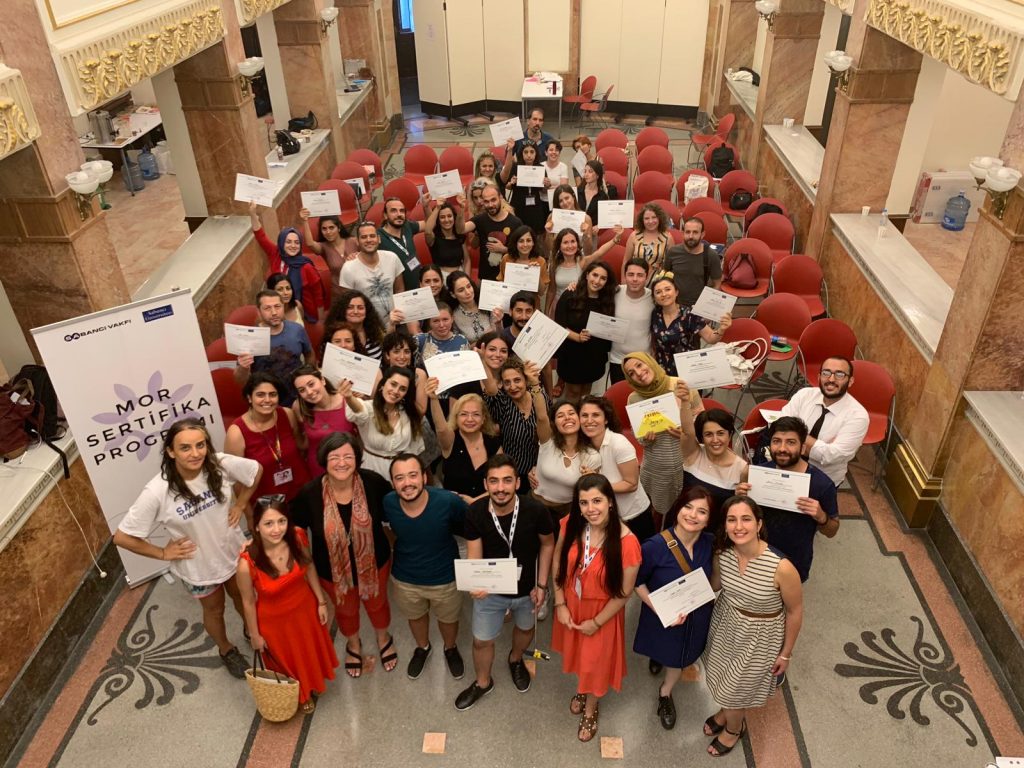
13 Sep It takes a village to raise a – gender-sensitive – teacher!
SU Gender has been organizing the Purple Certificate Programme (PCP) since 2006. This Programme aims to raise awareness on gender equality among high school teachers, faculties of education, students and civil society representatives. It aims to create an education environment which is free of gender-based discrimination and encourage education practices which are gender-sensitive. In 2017, Purple Folders were created, these were folders created after meetings where high school teachers, professors, experts and education faculty students come together and discuss what materials could be useful for high school teachers to integrate a gender perspective to the official syllabi. Since the launch of PCP, close to 3900 teachers and 50 civil society representatives attended the education programs that were organized. Throughout these years, the content and methods of the programme have been developed and updated, based on the feedback received from participants, experts’ opinions and any insight gained in the various panels and conferences organised by SU Gender on gender and education. This year’s one-week Purple Summer School, held at Sabancı University hosted 50 teachers from 27 cities, working in different academic fields such as philosophy, literature, math, arts, sciences and so on. The program included sessions on basic concepts of gender, women in history of science, gender and literature, gender and space, gender and law, masculinities, adolescent mental health and examples of good practices in gender-inclusive education. The programme lasted for a week and saw participants attend seminars in the daytime and arts and body workshops in the mornings and evenings.
The interaction between teachers, trainers and the SU Gender team, which took place during the Programme, provided the SU Gender team with a huge insight into the current practice and status of gender-inclusivity in education.This insight was particularly important considering the current political climate in Turkey which has seen some conservative journalists and politicians calling for the removal of Turkey’s signature from the Istanbul Convention and the CoE Action against violence against women and domestic violence. There have also been demands to eliminate all references to gender equality in syllabi, research centers and so on, as is considered not to comply with society’s cultural values. Many scholars and activists have argued against these demands. In light of these backlashes, gender equality units and research centers in higher education institutions have become critical in showcasing the importance of gender equality works and how these studies benefit society. Against this background, PCP’s activities were clearly vital for dissipating the negative perspectives on gender equality and showcasing the necessity of embedding gender equality in education.
During the Purple Summer School, there was one key consideration worth highlighting: Integrating gender perspective into teaching methods, syllabus and daily practices of students requires more than one teacher’s awareness and efforts. It requires that principals of schools, colleagues and families of the students are supportive of the gender equality agenda. Hence the title, “it takes a village to raise a gender sensitive teacher”, which refers to the proverb “it takes a village to raise a child”, emphasizing that raising a child is a collective effort and each actor in a society, including but not limited to the family, has a significant role in raising a child and will impact their development. However, as a programme for teachers, PCP has become a platform which recognises both the limitations and potentials of training high school teachers on gender equality. In this blogpost we would like to draw upon these limitations, potentials and what PCP does in response to these conditions.

Most of the education programmes in Turkey for teachers do not include gender perspective. In light of this, teachers who do integrate a gender perspective to teaching do it because they are personally interested in the topic, and wish to counter gender-based discrimination and injustices which they observe in their schools and classrooms. Indeed, a major issue raised by the participants was that the isolation and loneliness these teachers felt, as some of their colleagues had little awareness on gender equality issues and others reject the conception in its entirety.
Additionally, it is often seen as more acceptable to advocate for equality between girls and boys but it remains challenging for teachers to discuss and advocate for LGBTIQ+ students’ rights, particularly in smaller cities and more conservative regions in Turkey. Also, many teachers are unaware of the issues these students and have stated that they only became aware of LGBTIQ+ identities and some of the issues they may face after attending PCP. Making sense of gender politics in a way that recognizes LGBTIQ+ people is believed to be a rather “secondary” concern when compared to issues of child marriage, problems that refugee children face at schools and sexual harassment of children.
Due to the fact that the governance of schools are characterized by a top-down hierarchy, the principals of schools can act as the utmost authority. In light of this, teachers often feel there is little space for them to take the initiative on organising activities aimed at raising awareness on gender issues. In order to mitigate these issues and concerns PCP follows several strategies: When putting out calls for participants, school principals are prioritised as it is known that they will have a broader influence at the schools they work at. Another strategy is to accept the applications of two teachers from particular cities which are well known to be challenging areas for teachers who work on gender equality issues, in order to bring them together and foster a sense of solidarity between them. When organizing trainings for civil society representatives, it also becomes favorable to invite those from cities which are challenging to work in from a gender equality perspective. Another method used is to undertake follow up both physically with participants, with meetings, as well as through webinars. Following the PCP, teachers can take the Purple Folders with them. These are folders with various materials linked to gender equality for each subject field taught at high schools which are organised in line with the official syllabus teachers are obliged to follow. As a response to the concerns about introducing LGBTIQ+ considerations in the classroom, the folders allow the teacher to be able to decide whether to include these considerations or not. And finally, all PCP participants are invited to be a part of the teams who compose the Purple Folders, so that their efforts may be collected and used by many other teachers.
- All these issues raise the following question: Are educators working within a central education system which is capable of transforming society by allowing gender-sensitive interventions in classrooms and schools? The teachers attending PCP are eager to undertake this work because against all odds they feel powerful on several fronts:
- An average high school teacher reaches some 1000 students and 50 teachers in an academic year.
- Children are open to new ideas discussed in classrooms.
- Teachers emphasize that after the intensive training sessions which are full of novel perspectives on gender equality and education, they feel as if they are freshly graduated teachers, and their passions are renewed and they become inspired to implement all that they have learnt during the trainings they have attended, to classrooms and beyond.
- To support this sense of passion and eagerness, also giving an ear to all the concerns which are raised, PCP is updated, transformed and being transformative each year.




No Comments